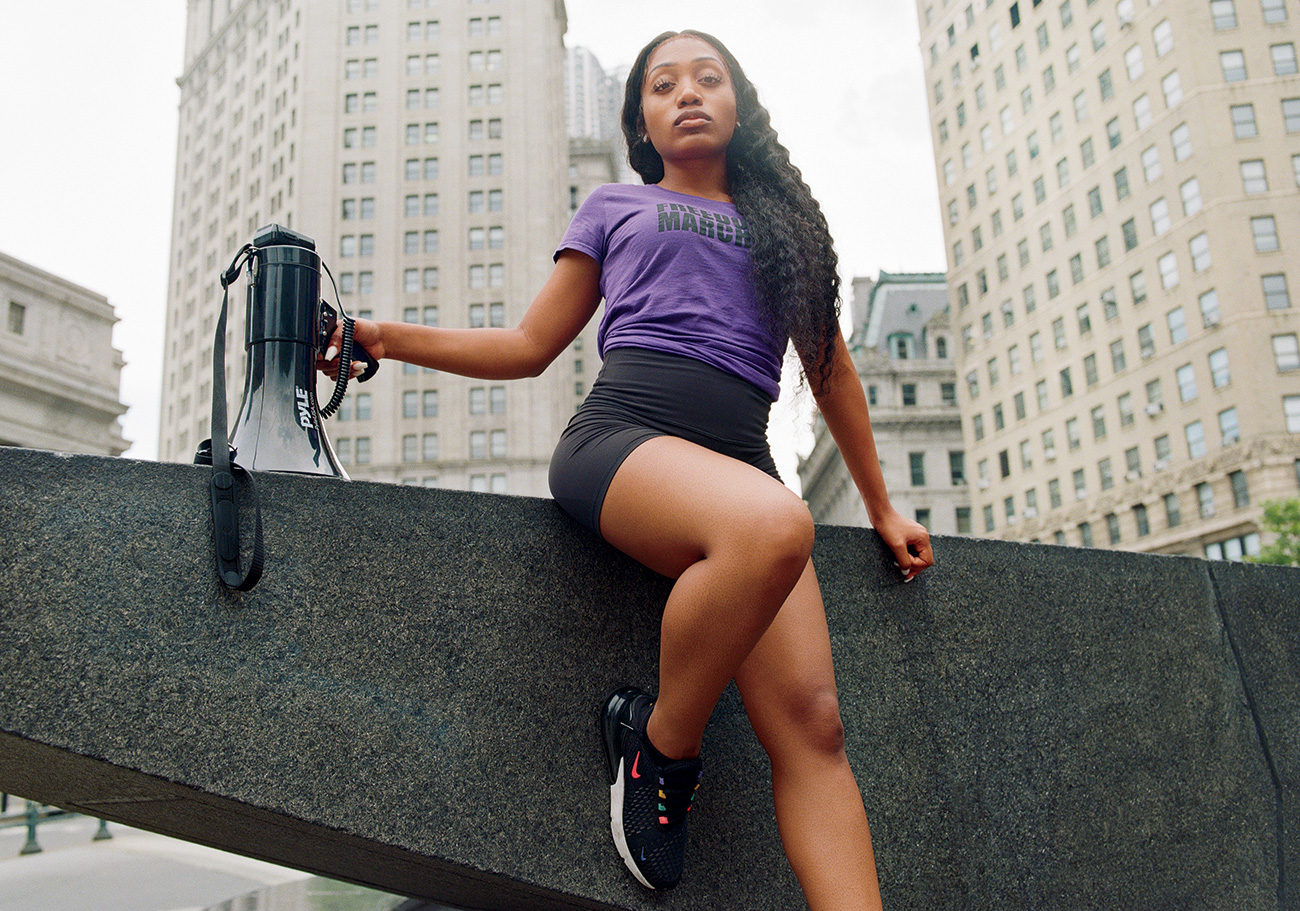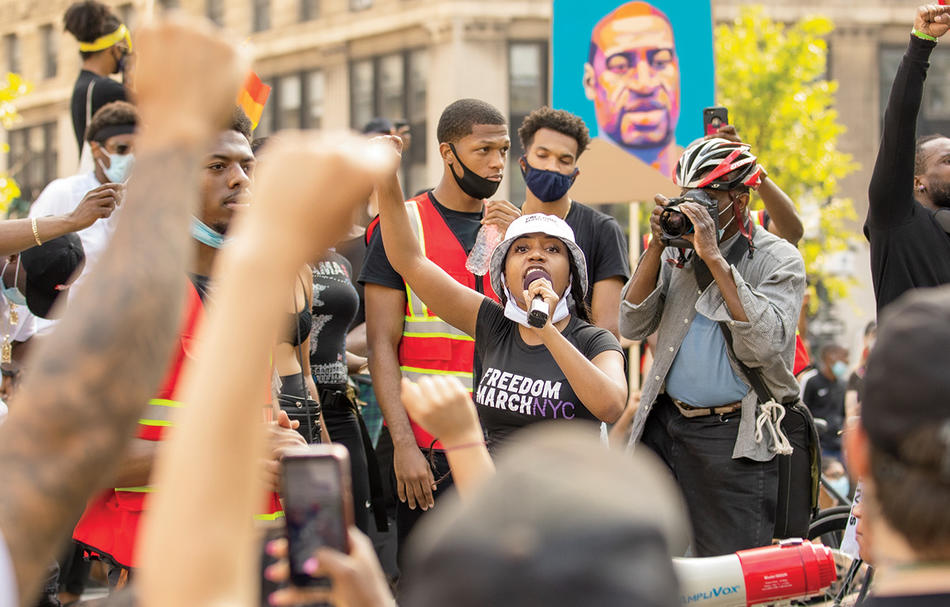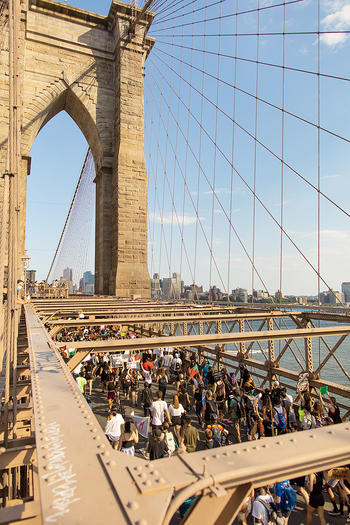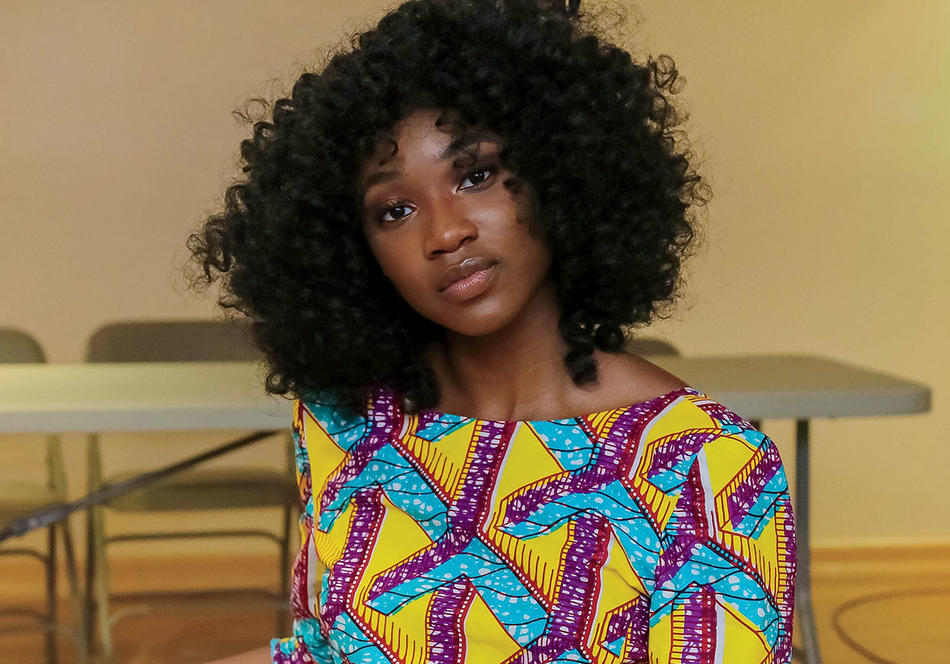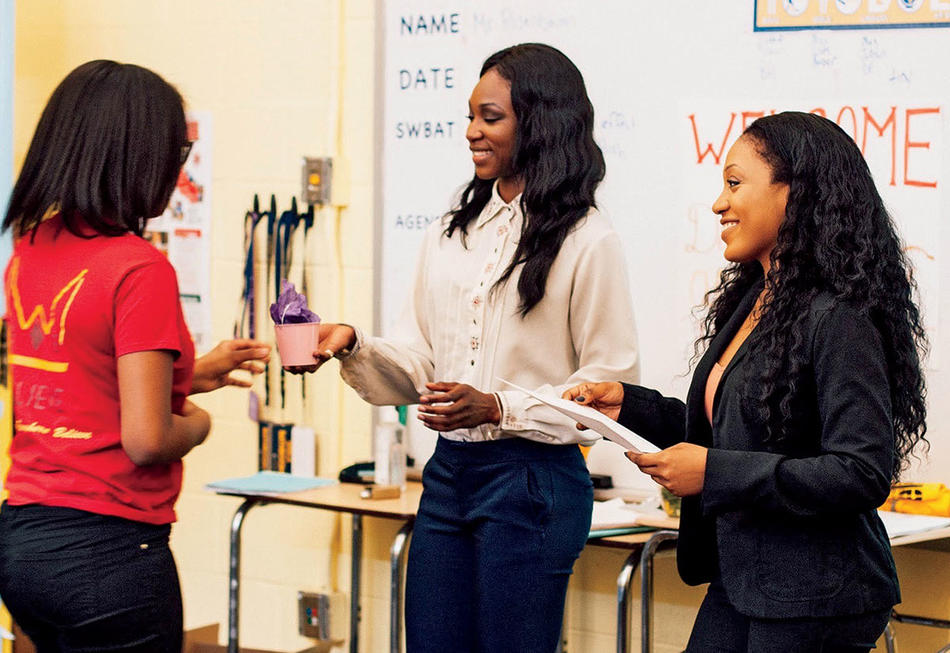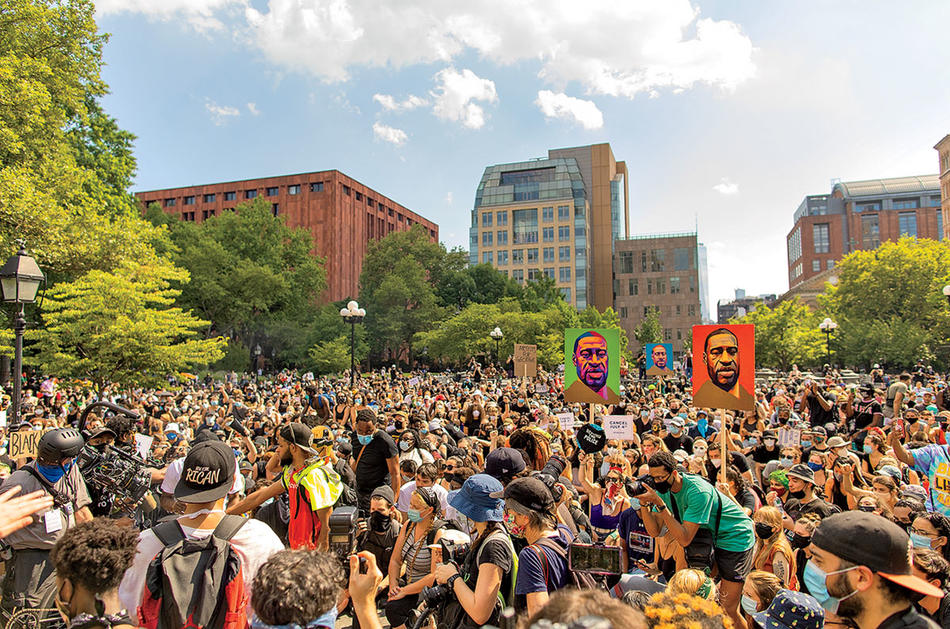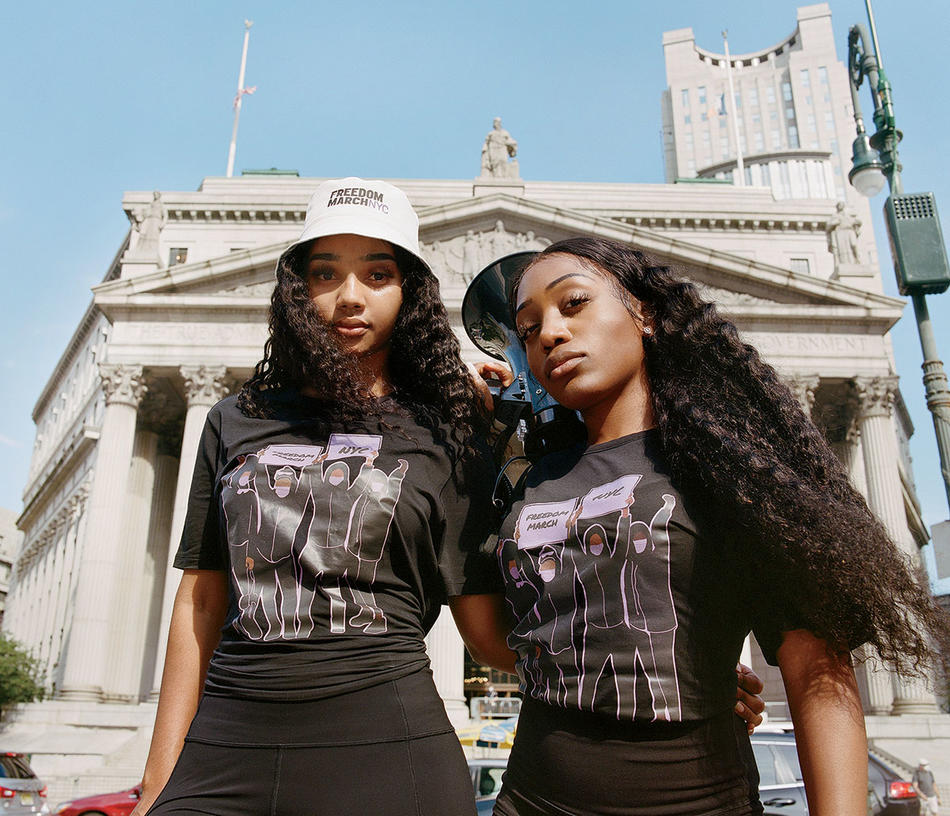Standing on the edge of a fountain at Foley Square in Lower Manhattan against a backdrop of white-columned courthouses, Chelsea Miller ’18CC lowered her face mask, lifted her megaphone, and raised her voice. It was July 4, 2020, and Miller was about to give her own take on the state of independence. “Today we know our history,” she declared, addressing the diverse crowd of young people that had followed her through the streets from Madison Square Park, chanting and drumming. “Today we are reminded of a delayed promise by this America — a promise that says independence, freedom, and justice for all. But are we all free?”
“No!” boomed the response.
“Are we all free?”
“No!”
“Today,” said Miller, “we do the work of making sure that our voices are heard.”
Dressed in black bike shorts, a black T-shirt, and a white bucket hat, her right fist raised in power and solidarity, Miller was fired up. Michael Brown, Eric Garner, Tamir Rice, Philando Castile, Tony McDade, Sandra Bland, Atatiana Jefferson, Breonna Taylor … Miller could say all their names. A social-impact entrepreneur and public speaker who grew up in Flatbush and East New York, she was already well acquainted with the many manifestations of systemic racism. But it was the outcry and protests over the police killing of George Floyd that put Miller, twenty-three, at the head of mass demonstrations virtually overnight.
The weekend after Floyd’s death, Miller had joined a protest in Brooklyn with her younger sister, Nia White, and a few friends. The crowd that gathered in front of the police barricades outside the Barclays Center was met with pepper spray and batons, and more than two hundred people were arrested. “I saw total disorganization,” Miller says. “A lot of the protesters were inexperienced. People started running, and if you know anything about the NYPD, if you start running it gives them a reason to say they’re in pursuit of you and continue to charge. It was really disheartening, because it was clear that so many people had come out to have their voices heard.”
The next morning, a Sunday, Miller got a call from her friend Nialah Edari ’17BC, who had attended a protest in Manhattan. They discussed how some politicians were using incidents of vandalism to discredit the overwhelmingly peaceful majority of demonstrators. Then they searched social media for an organized protest that night. When they didn’t find one, they decided to put together their own march, with a planned route and specific demands for police accountability. They had just a few hours to make it happen. “We felt that if we didn’t amplify our voices as organizers, then the media would take control of the narrative,” Miller says. “This movement is about Black lives and Black futures, but without a strategy the message falls on deaf ears.”
And so at noon on May 31, which was the ninety-ninth anniversary of the Tulsa race massacre, Miller posted a notice on Instagram under the name “Freedom March NYC,” announcing a protest that would start at 8:00 p.m. that night in Washington Square Park. She called on allies to spread the word, and a few hours later, when Miller, Edari, and co-organizers White and Fatimah Barrie arrived at the park, a small knot of protesters had already gathered. They began to chant, and the numbers quickly grew. People from other groups, including Black Lives Matter of Greater New York, showed up, and the crowd swelled to a few hundred. As an NYPD helicopter rumbled overhead, Miller and Edari led the marchers out of the park and into the streets, down to One Police Plaza, where they read their demands.
Over the following days, the two women would raise more than $50,000 for Freedom March NYC and organize more protests, including a Juneteenth march in Brooklyn and the July 4 march in cooperation with Unite NY and supported by Warriors in the Garden and Strategy for Black Lives. They would also commit to building their organization into a youth-led civil-rights group with a mission to train organizers nationwide in nonviolent mobilization.
“We are doing this for future generations,” says Miller, “so that they do not have to say any more names.”
The New York Times estimates that between fifteen and twenty-six million people participated in demonstrations in the weeks following the death of George Floyd, which makes the anti-racism protests of 2020 the largest social movement in US history. To explain it, experts point to a unique combination of factors: a pandemic that triggered mass unemployment and highlighted racial health disparities, a string of high-profile racially motivated incidents (including the shooting of Ahmaud Arbery in Georgia and the false 911 call placed by a white woman in Central Park against a Black birdwatcher), and what Thai Jones ’02JRN, ’12GSAS, curator for American history at Columbia’s Rare Book and Manuscript Library, describes as “reactionary white-supremacist language coming from the highest levels of federal power.”
For a generation plugged into social media, the nearly nine-minute video of Floyd’s execution was a breaking point. “The burden on young people is beyond anything we can understand,” says Jones, who studies radical social movements and teaches in the Columbia University and Slavery seminar, held each spring. “They are seeing their hopes and plans for their immediate and long-term futures being upended. The fact that, despite all this, they have hope for this transformational vision of a better society is what gives this movement so much power.”
To watch Miller lead a protest is to witness the conversion of pain and rage into political power in its most fundamental form. With Edari and White marching beside her (at seventeen, White is the youngest organizer on the ground), bouncing on their sneakers to the catchy, melodic chants while dozens of photographers in front of them maneuver for position, Miller projects passion, confidence, and unyielding determination. That she should be at the front of these historic marches comes as no surprise to her Columbia peers. Akua Obeng-Akrofi ’18CC calls Miller a “force” and a “visionary.” The two women were first-year suitemates in Carman Hall and became friends the moment they met. Miller was a Kluge Scholar (a program endowed by John Kluge ’37CC, ’88HON) and a Jackie Robinson Scholar (a program run by the Jackie Robinson Foundation, chaired by Gregg Gonsalves ’89SEAS and Sharon Robinson ’76NRS), and in the summer of 2015, she won a Presidential Global Fellowship to study political science in Istanbul and Tunis.
Obeng-Akrofi, too, was a dizzyingly high achiever. Born in Ghana and raised in Atlanta, she was recruited by the Ghanaian national track-and-field team and qualified for the 2016 Summer Olympics in Rio de Janeiro. A psychology major, she served as president of the Columbia chapter of the NAACP and in 2018 received the Campbell Award, established in honor of Columbia Alumni Association cofounder and Trustee chair emeritus Bill Campbell ’62CC, ’64TC, ’15HON and presented to a graduating student from each school who shows outstanding leadership.
At Columbia, Miller and Obeng-Akrofi, though busy with their studies and extracurriculars, felt a need to do something more. One night in the spring of 2016, during their sophomore year, they had a talk. “There was a buildup of frustration with police brutality and a feeling of helplessness in the Black community,” says Obeng-Akrofi. The past year had seen the police killings of Freddie Gray, Walter Scott, Samuel DuBose, Natasha McKenna, and Greg Gunn, and the women discussed what they could do to bring hope. Since they both had mentoring experience, they brainstormed about some key lessons that they’d want to teach young girls — “stuff we felt we’d have wanted to learn at that age,” Obeng-Akrofi says. They came up with an idea for a nonprofit called Women Everywhere Believe (WEBelieve), which Miller describes as a “national leadership pipeline for women and girls of color.”
That summer, with a grant from Vital Voices, a nonprofit that works with women leaders, they developed a curriculum, and in the fall they reached out to several New York City schools. “We told them, ‘We’ll bring all the supplies; you just provide the students,’” says Obeng-Akrofi. They heard back from a school in Harlem and did an eight-week pilot program there, with classes in goal-setting, STEM, Black women’s history, and civic engagement.
The program was enthusiastically received, and Miller and Obeng-Akrofi decided to build it out: through videos and social-media posts they inspired women at other colleges to start chapters on their campuses. WEBelieve now has more than twenty chapters in eight states and one in India.
Meanwhile, the women lived their dreams. Obeng-Akrofi, a three-time champion Ivy League sprinter, went to the Rio Olympics with Team Ghana. And Miller became part of the last intern class of the Obama administration, working in Washington on criminal-justice reform.
“One day we went to the West Wing, and President Obama spoke to us about leadership and how the future is in our hands and the importance of us stepping up when we leave,” says Miller. “Those words never left me.”
Miller was also greatly influenced by two professors: sociologist Carla Shedd (“I’ll swear by her forever,” says Miller), whose 2015 book Unequal City: Race, Schools, and Perceptions of Injustice, a study of adolescents in Chicago’s racially stratified school system, reflected Miller’s own experience in Brooklyn; and law professor Kimberlé Crenshaw, whose African American Policy Forum started the Say Her Name movement to bring attention to Black women and girls killed by police. Crenshaw developed the concept of intersectionality, which describes how traits like race, gender, and class overlap to shape a person’s identity and experience.
“The first time I heard the term ‘intersectionality’ it resonated so much with me as a Black person, as a Black woman, as a first-generation American, as the daughter of immigrants,” Miller says. “I was finally able to put into words why I’ve been able to understand people’s challenges without necessarily having experienced them. Having all these intersecting identities and experiences, I don’t need to be Native American or to be from the LGBTQ+ community to empathize with their stories. When someone says, ‘I’ve been hurt, and this system has served to oppress me and silence my voice,’ it’s mind-boggling that it takes generations for us to say, ‘I see you. You’re human.’”
Obeng-Akrofi, who also recognizes the importance of stepping up to lead, credits her mother with instilling confidence in her at an early age. “My mom is a believer in the power of the tongue and speaking what she wanted into existence,” she says. “From the beginning she would speak things into me — she would say she saw leadership in me and that I would go far. And I believed it.” In watching “leadership play out with the women in my life,” Obeng-Akrofi developed a credo: “If I have any resources and can elevate somebody who is next up, I’m going to do so. That’s just a matter of ‘each one, teach one’ and being able to give what I have in order to see growth in our community.” She counts Miller as one of those women whose leadership has left a mark. “Chelsea is very strong,” she says. “She isn’t shaken or moved by obstacles. She’s an amazing leader in that she not only has a clear vision for what she does but also understands the role she plays in that vision and knows her place in it.”
In the fall of 2015, Miller met Edari, then a Barnard junior. Edari was raised in Milwaukee in a family steeped in the fight for racial justice. She grew up hearing stories about her paternal grandfather, who was born in a segregated hospital in Jim Crow Mississippi, and her maternal great-grandfather, the son of Jewish immigrants from Belarus and a strong ally of the Black community in Madison. In 2014, after a grand jury in Ferguson, Missouri, failed to indict the police officer who killed Michael Brown, Edari assembled a group of students and organized a protest in Herald Square on Black Friday to disrupt the annual shopping frenzy. More than 150 people showed up, and it made the news.
Both Edari and Miller belonged to Lambda Chapter of Alpha Kappa Alpha, the first Black Greek sorority, founded in 1908. “That played a huge role in our activism during college and also solidified our relationship,” says Miller. In February 2016, Miller invited Edari to speak at a WEBelieve event about her roles in the Barnard Organization of Soul Sisters (BOSS) and the Reverend Al Sharpton’s National Action Network, for which she served as Midwest regional youth director. That same month, Edari, who was co-chair of Columbia University Black History Month, asked Miller to be on Edari’s panel on empowering Black girls. Freedom March NYC has its roots in this bond of mutual respect and support.
“It’s been a blessing to do this work with Chelsea,” Edari says. “She’s low-ego, and you can’t do this work with a high ego. And although I have organizing experience, Chelsea brings other angles, such as business acumen and social-media skills.”
And so the two women were well prepared to meet the moment in 2020. Unlike the civil-rights movement of the 1950s and 1960s, today’s campaign is made up of myriad organizations and has no prominent figures or personalities, no icons or spokespeople — an arrangement that runs the risk of making the messaging less cohesive and effective. But activists like Miller and Edari, who place the overlooked, centuries-long struggles of Black women at the forefront of their work, are keeping the agenda focused. “Movements go up and go down,” says political scientist Fredrick C. Harris, dean of social sciences at Columbia, “but the key part of sustaining a movement is what these young women are doing: they’re organizing. There is a connection between protest politics and electoral politics, and so it’s not just about protests — it’s also about setting the political agenda, electing people, and holding them accountable when they get in office.”
A week into the life of Freedom March NYC, Miller and Edari created a five-point policy platform, and they are now working with a state legislator to turn their proposals into bills. First on the list? “Reallocating NYPD resources for education,” Miller says.
In a city where police have the latest hardware and children have outdated textbooks, Freedom March NYC is advocating for what it sees as sensible reductions of the $6 billion annual NYPD budget (police departments are often the largest line items for US city governments) in order to support other priorities. (In June, the City Council approved a budget that nominally shifted $1 billion from the NYPD, but critics assailed it as “funny math” and “smoke and mirrors.”)
“The defund issue has been sensationalized,” Miller says, “and yet we’ve been defunding education for years. The resource disparity among public schools is fixable, so why are we acting like it’s not? And I use the word ‘acting’ intentionally, because it truly is an act. We’re seeing a lack of conviction in our politicians. Their campaigns rest on being in bed with the NYPD and the police unions. Our question for them is, Who are you representing? You’re not the voice of the people, because the people want change.”
Freedom March NYC’s second goal is to remove the police from schools and replace them with guidance counselors and therapists — and also to provide community programs for kids. The presence of police in schools sends a negative message and leads to students “getting arrested simply for having a bad day as children,” Miller says. “There is no difference between being a white child and being a Black child. You still act out, you’re still mischievous — we all are. The only difference is that one is deemed more criminal than the other.” The transition will require much research and deliberation, says Miller, but the need is clear. “There are external factors that prevent kids from excelling in school and having a safe environment. Are we going to critically address the systemic issue, or will we look away?”
Miller sees the third goal — the establishment of a New York City youth public advocate — as the most readily attainable, citing youth commissions in Philadelphia and Los Angeles. “In New York, young people are never present at the table,” Miller says. “Why not create a space and budget to get more youth involved in politics and activism? It’s nothing that shouldn’t be there already.”
Points four and five deal with procedure for police misconduct. “In New York, the police investigate these cases. That means coworkers are investigating coworkers, which doesn’t make sense,” says Miller. “There needs to be a very transparent way of doing this, as well as measures to hold police officers accountable to the community.” Freedom March NYC is also calling for an end to qualified immunity, which protects officers from lawsuits for most harm done in the course of policing. “There is no reason why police officers are exempt from being sued if they are behaving wrongfully, if their actions are hurting citizens,” says Miller, “especially since our tax dollars are paying for them.”
Miller sees this plan as a start, adding that “we can’t talk about freedom in just five points. This is the long game.” But time is short: “The youth are impatient,” says Miller. “We’re told that change isn’t possible, but the pandemic has shown that society can pivot: we were able to think differently about how we study, how we work, how we shop. When leaders choose to prioritize something, the reaction is swift. That’s clear.
“So what is to stop us from recognizing that for four hundred years we’ve had another pandemic that’s been killing people at disproportionate rates? When are we going to cast the same energy toward racism, with the same sense of urgency?”
Miller’s first and greatest hero is her mother, Hazel Ferguson, a Jamaican immigrant who came to the US in the 1990s. “She inspired me in so many ways,” says Miller, who is the second-youngest of six children. When Ferguson first arrived in New York, she supported her family by doing whatever it took: she braided hair, worked as a nanny in Park Slope, became a dental assistant; then she got her PhD in psychology and is now a licensed social worker. A single mother who worried that her children (five girls and a boy) wouldn’t get the same quality of education in their own school district as the kids she cared for in the Slope, Ferguson sent Miller and her siblings on long bus rides to attend schools in higher-income neighborhoods. Says Miller, “I remember being ten and thinking, Why do all my classmates live around the block and their parents are outside at dismissal time? Why do I live so far away?”
As she got older, Miller started to understand that there are “two realities, not only in America but in New York City,” and that “our communities are the legacy of redlining.” Redlining, a practice of denying federally backed mortgages to African-Americans by designating their neighborhoods as credit risks, began during the New Deal and resulted in segregated communities with severely unequal resources. “Going to that school opened my eyes and pushed me to go harder and want more,” Miller says. “I thought, There’s clearly more out here than what they’re showing us, and I’m going to find it, and I will find it, because when you come from the background that I do — when you have a mother who is a warrior — you know you can’t stop at the first door that closes. You have to keep on pushing and find opportunities. I have gone to tremendous lengths to make my mother proud.”
When Miller was twelve, the family moved from Flatbush to a two-family house in East New York. Having been a caseworker for kids in the foster-care system, Ferguson turned one half of the house into a group home for girls in foster care. In addition to her four sisters, Miller also had foster sisters. Their stories revealed the profound dysfunction of city agencies. “I’ve had foster sisters who’ve been raped in the system and no one believed them,” says Miller. “I’ve seen teenagers who just want to go back to their families, but the city says they can’t because the home is too unstable or the parents are unfit. But you can’t take kids from abusive households and put them in other abusive households, just because you’ve decided that’s what’s best for them.”
It was this intimate understanding of the plight of foster children — especially girls — that shaped Miller’s consciousness and led her to cofound WEBelieve. And the girls in the program have influenced her in turn. “I talk to girls about Harriet Tubman and all these incredible Black women leaders who paved the way for them,” Miller says. “And I’ve realized that we can’t talk about civic engagement and leadership without being the leaders our generation needs.”
Miller is talking about leadership not just in the classroom or in the boardroom but also in the streets. “It’s really a question of, when the horn blows, will you show up?” she says. “Will you put your body on the front lines for what you believe in?”
Figuratively and literally, Miller is walking the walk. Leading protests is draining work, and the emotional weight of current events and the physical demands of the marches “definitely takes a toll,” she says. “You want to make sure you’re present and amplifying the message, but you also need to keep in mind that you’re human and have to take care of yourself. It’s really important to keep up presence in the streets, to keep up the pressure and to show that we’re organized and can sustain ourselves.”
A major test will come in this election season. For Freedom March NYC, the fight is entering a new phase, with national elections in the fall and then, in 2021, city elections for mayor, comptroller, and City Council. Eyeing November, the group is teaming up with organizations in New York and other states to register and mobilize voters. Edari hopes to travel to her home state of Wisconsin as well as to Pennsylvania to help organize on the ground.
For Miller, this moment is one of those inflection points in history when you have to show up. The line has been drawn, and the trumpet has sounded.
“People ask themselves, ‘What would I have done during the civil-rights movement? What would I have done during the time of slavery?’” Miller says. “Well, this is your answer: whatever you’re doing now.”
This article appears in the Fall 2020 print edition of Columbia Magazine with the title "Take It to the Streets."
